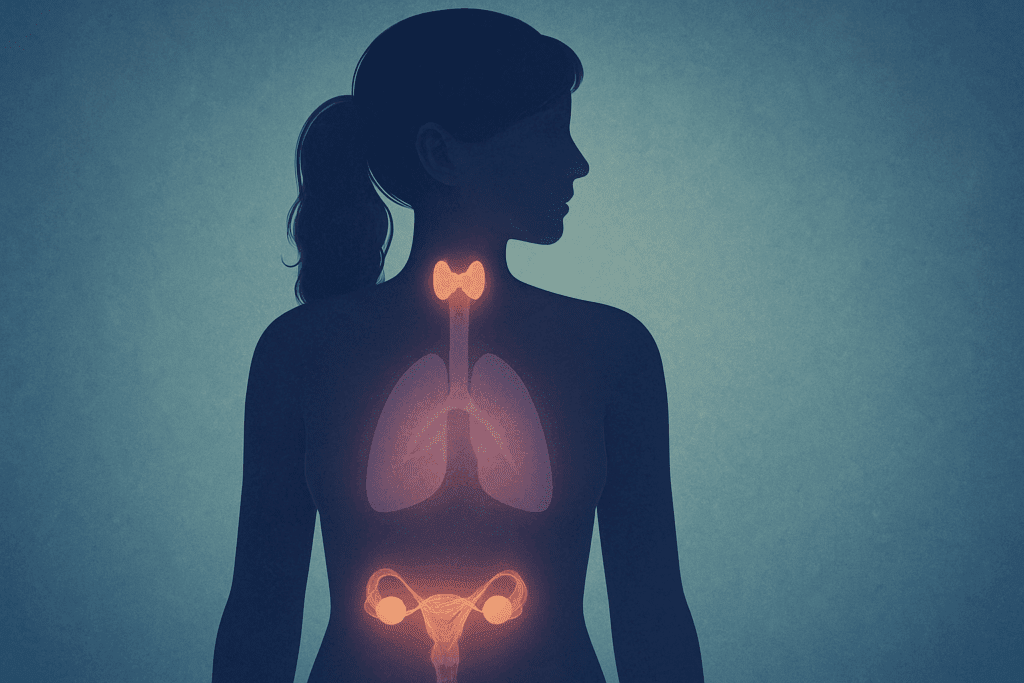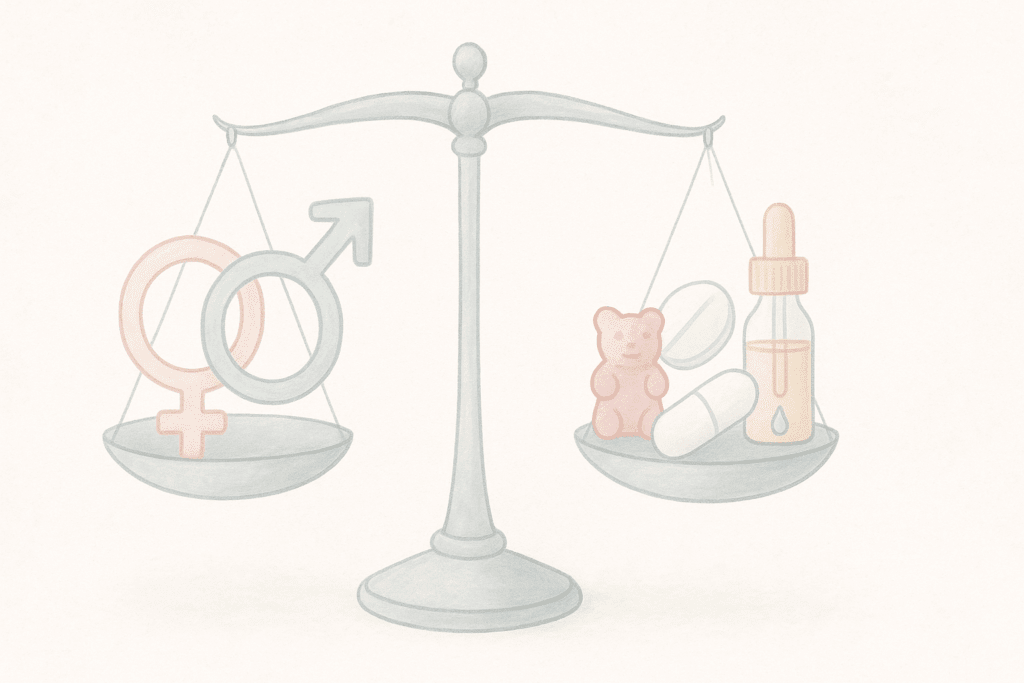The ketogenic diet has gained substantial popularity over the past decade, with promises of rapid weight loss, improved mental clarity, and sustained energy. Alongside the diet itself, keto-based supplements like keto drops and keto gummies have emerged as highly marketed tools designed to help individuals enter ketosis more quickly and maintain it more easily. While these supplements may appear as convenient options for busy individuals, particularly women looking to manage their weight and boost energy levels, it is essential to understand the potential risks and biological impacts they may carry. Especially for women, the interaction between ketogenic supplements and hormonal balance, metabolic function, and overall wellness warrants a closer examination.
You may also like: Is the Keto Diet Safe or Dangerous? What Experts Say About the Risks, Benefits, and Basics of the Ketogenic Diet

Understanding the Science Behind Keto Supplements
Keto drops and keto gummies typically contain ingredients such as exogenous ketones (often in the form of beta-hydroxybutyrate or BHB salts), medium-chain triglycerides (MCT oil), electrolytes, and various herbal additives. These compounds are marketed to support the body in reaching a state of ketosis, where fat is burned for fuel instead of carbohydrates. In theory, this helps accelerate fat loss and reduce the fatigue associated with the early days of keto dieting, commonly referred to as the “keto flu.”
However, while the mechanisms behind these supplements seem promising, they are not a shortcut to success. The body still needs to adapt metabolically to using ketones as its primary energy source, and artificial support from supplements does not eliminate this need. Moreover, their interaction with female physiology raises distinct considerations, particularly regarding menstrual health, thyroid regulation, and nutrient absorption. Therefore, before incorporating these supplements, it’s critical to review the full spectrum of keto drops side effects and keto gummies side effects through a medically informed lens.

Why Women May React Differently to Keto Supplements
Women often experience distinct physiological responses to dietary changes due to fluctuations in estrogen and progesterone, both of which influence metabolism, appetite, and insulin sensitivity. During various stages of the menstrual cycle, a woman’s body may require different macronutrient ratios for optimal functioning. The ketogenic diet, by drastically limiting carbohydrates, can unintentionally disrupt this balance. Introducing concentrated sources of ketones via keto drops or gummies may further intensify these shifts, leading to complications that are more pronounced in females than males.
Some of the most common keto side effects female users report include irregular menstrual cycles, increased fatigue despite calorie sufficiency, hair thinning, and heightened anxiety. These effects are often linked to a disruption in the hypothalamic-pituitary-adrenal (HPA) axis, which regulates hormonal communication and stress response. A sudden carbohydrate deficit, compounded by exogenous ketones, can send misleading signals to the body, mimicking a starvation state. In response, cortisol levels may spike, further complicating hormone regulation and energy stability.

Potential Keto Drops Side Effects Specific to Women
Keto drops, taken sublingually for fast absorption, often claim to help users bypass the adaptation period of a standard ketogenic diet. While their rapid delivery system may offer convenience, the intensity of ingredients introduced all at once can cause digestive, metabolic, and neurological disruptions. For women in particular, the onset of nausea, dizziness, bloating, and mood swings following the use of keto drops is not uncommon.
Another concern is the dosage inconsistency often found in over-the-counter keto drops. Unlike medications that undergo rigorous testing, many dietary supplements lack FDA oversight and standardization. Women with lower body weight or heightened sensitivity to hormonal fluctuations may be more vulnerable to these inconsistencies. Moreover, if keto drops contain caffeine or other stimulants as metabolic boosters, the potential for adrenal fatigue increases, especially in those already under stress from work, parenting, or poor sleep.
Additionally, the electrolytes included in many keto drops are meant to offset the fluid and mineral loss associated with early ketosis. However, these can be a double-edged sword. In women prone to high blood pressure or those taking medications for heart conditions, an unmonitored increase in sodium, magnesium, or potassium can lead to imbalances, posing potential health risks such as palpitations or cramping.

Keto Gummies Side Effects: What Female Users Should Know
Keto gummies are often marketed as a more palatable and enjoyable alternative to pills or powders. However, their pleasant taste and candy-like form can create a false sense of safety and even lead to overconsumption. In many cases, these gummies contain sugar alcohols such as erythritol or xylitol to maintain flavor without increasing carb content. While generally considered safe in moderation, these compounds can cause significant gastrointestinal distress, including bloating, gas, and diarrhea, particularly in women with IBS or other digestive sensitivities.
Another concern surrounding keto gummies side effects is their potential interaction with female hormones. Certain formulations contain herbal ingredients like green tea extract or Garcinia cambogia, both of which have been associated with altered estrogen levels or disrupted metabolism. For women with polycystic ovary syndrome (PCOS), endometriosis, or thyroid conditions, these additives could exacerbate symptoms or interfere with existing treatment plans. Women trying to conceive should also exercise caution, as hormonal shifts linked to aggressive ketosis or exogenous ketone supplementation can affect ovulatory patterns.
Moreover, some keto gummies are fortified with synthetic vitamins to compensate for nutrient losses. While this may sound beneficial, synthetic vitamins are not always absorbed efficiently, especially in the context of a fat-heavy diet where bile production and gut microbiota influence absorption. If a woman’s digestive system is already taxed from sudden dietary changes or chronic stress, these additives may be more harmful than helpful.

The Link Between Ketogenic Supplements and Female Hormonal Health
Hormonal balance is one of the most delicate systems in the female body, and any external factor—dietary or environmental—can tip the scale. The introduction of keto drops or keto gummies in a woman’s routine may trigger a cascade of effects involving reproductive hormones, stress hormones, and thyroid function. One area of growing concern is how ketone supplementation can influence leptin and ghrelin—the hormones responsible for hunger and satiety.
Disrupted levels of leptin, particularly in women, have been linked to decreased fertility, mood instability, and immune dysfunction. Because a ketogenic state lowers insulin and leptin levels, it can cause the body to think it’s in a prolonged fasted state, even if caloric intake remains adequate. This signaling can suppress the hypothalamus, which in turn affects the production of estrogen and progesterone. In women approaching perimenopause, such suppression may worsen hot flashes, disrupt sleep, and amplify mood disorders.
Furthermore, thyroid function can also be impacted. The thyroid is extremely sensitive to energy availability, and a drastic reduction in carbohydrate intake—especially when paired with keto drops or gummies—can reduce the conversion of T4 to T3, the active thyroid hormone. This slowdown in thyroid function can manifest as cold intolerance, weight gain despite calorie control, fatigue, and cognitive fog. For women already managing hypothyroidism, such changes could require medication adjustments or careful monitoring.
How Keto Side Effects in Females May Differ From Males
Although many men report relatively smooth transitions into ketosis or when using exogenous ketones, women often face more nuanced challenges due to their complex endocrine systems. For example, while men may experience temporary fatigue or digestive changes, women are more likely to encounter cyclical disturbances, such as irregular periods, changes in libido, or even amenorrhea—the complete cessation of menstruation.
Moreover, studies suggest that women have a more reactive hypothalamic response to energy deficits, which can lead to faster downregulation of metabolic processes. This means that even with supplementation, female users might struggle with long-term adherence to the ketogenic lifestyle if their body begins conserving energy by slowing metabolism, increasing cravings, or altering mood. These adaptations, although protective in evolutionary terms, can make keto supplements less effective—or more problematic—for women over time.
In addition, psychological responses to keto side effects female users report may differ. Women often describe heightened anxiety, obsessive thoughts about food, or emotional volatility during early ketosis. These symptoms can be exacerbated by the use of stimulants or appetite suppressants commonly found in keto drops or gummies. Without adequate emotional support or nutritional guidance, such challenges can become long-term mental health burdens.

Practical Guidelines for Women Considering Keto Supplements
Before beginning any ketogenic supplement regimen, women should consider working with a healthcare provider who understands the intersection of nutrition, endocrinology, and women’s health. A functional medicine practitioner or registered dietitian with experience in keto nutrition can help monitor hormone levels, thyroid markers, and nutrient status throughout the journey.
It is also advisable to start slowly. Instead of jumping into full ketosis with the help of high-dose keto drops, women might consider easing into the process with dietary changes alone and gradually introducing supplements after their body has begun to adapt. Monitoring energy levels, mood, menstrual regularity, and digestion can provide early indicators of how well the body is responding.
Hydration and electrolyte balance should also be prioritized. While keto drops often contain electrolytes, individualized assessment is critical to avoid over- or under-supplementation. Tracking daily sodium, potassium, and magnesium intake—along with blood pressure and symptoms like muscle cramps—can offer helpful insights. For keto gummies, examining the label for sugar alcohol content, added stimulants, and synthetic vitamins is essential. Women with sensitive digestive systems or hormone-related conditions should avoid products with questionable additives.
Finally, it’s important to remember that supplements are not magic bullets. Sustainable changes in weight, energy, and cognitive clarity require consistent effort in diet, movement, stress management, and sleep. Keto supplements may play a supporting role, but they should not be relied upon as the primary driver of health outcomes.
Frequently Asked Questions (FAQ): Keto Drops, Keto Gummies, and Side Effects in Women
1. Can keto drops affect mental health differently in women than in men? Yes, keto drops can impact mental health differently in women due to fluctuations in hormone levels throughout the menstrual cycle. For example, shifts in estrogen and progesterone influence neurotransmitter activity, which plays a role in mood regulation. Some women using keto drops report increased irritability, restlessness, or anxiety during the luteal phase of their cycle, a period already prone to emotional sensitivity. While keto drops may provide energy benefits, their stimulation of metabolic and neurological activity can exacerbate emotional highs and lows in females. This highlights a need for personalized timing and dosage, particularly when evaluating keto drops side effects for women with mood disorders or premenstrual syndrome.
2. How do keto gummies side effects manifest differently in women over 40? In women over 40, keto gummies side effects may be compounded by age-related hormonal shifts and changes in digestive efficiency. As estrogen begins to decline in perimenopause, many women experience a slowing metabolism, heightened insulin resistance, and gut microbiome alterations. These factors can amplify bloating, cramping, and fatigue triggered by sugar alcohols or herbal extracts commonly found in keto gummies. Furthermore, some keto gummies may interfere with hormone replacement therapy or medications used for thyroid support, making side effects less predictable in this age group. Women navigating midlife hormonal transitions should approach these products with extra caution and ideally under medical supervision.
3. Is there a safe way to experiment with keto drops while breastfeeding? Breastfeeding women are advised to avoid keto drops unless approved by their healthcare provider. The postpartum period is marked by extreme hormonal shifts and increased nutritional demands, particularly in micronutrients such as calcium, magnesium, and folate. Some keto drops contain caffeine, herbal stimulants, or electrolyte loads that could pass through breast milk, potentially affecting infant digestion and sleep patterns. Additionally, keto drops side effects like dehydration and appetite suppression can negatively impact milk production. For women who are breastfeeding and considering keto supplements, a nutrient-dense, whole-foods approach is a safer alternative to maintain both milk supply and metabolic health.
4. Can keto gummies interfere with fertility or ovulation in women? Yes, keto gummies may influence fertility, particularly when used long-term or in high doses. Certain active compounds in keto gummies, such as exogenous ketones or appetite suppressants, can signal to the body that it is in a calorie-deficient or stress-induced state. This can reduce levels of reproductive hormones like luteinizing hormone (LH) and follicle-stimulating hormone (FSH), both essential for ovulation. Keto side effects in females often include cycle irregularities or even temporary amenorrhea, particularly in those with already low body fat percentages or high stress levels. Women trying to conceive should monitor changes in their cycle closely and seek medical guidance before using keto-related supplements.
5. Are there long-term metabolic risks associated with using keto drops for weight loss in women? Yes, prolonged use of keto drops can lead to metabolic adaptations that may backfire over time. While initially effective at boosting fat metabolism, extended reliance on keto drops can reduce the body’s natural ketone production, weakening metabolic flexibility. In women, this can also impair thyroid responsiveness, as chronic low carbohydrate intake and exogenous ketone supplementation suppress triiodothyronine (T3) levels, essential for metabolic rate. Another long-term risk involves nutrient depletion, particularly of B-vitamins and trace minerals, due to shifts in digestion and reduced dietary variety. For sustainable weight loss, it’s better to view keto drops as short-term aids rather than daily staples, especially given the nuanced nature of keto side effects in females.
6. Why do some women experience worsened sleep after taking keto gummies? Sleep disruption is a lesser-known but increasingly reported concern among women using keto gummies, particularly those containing green tea extract or other stimulants. While these ingredients can enhance daytime energy, their lingering effects may interfere with melatonin production or elevate nighttime cortisol levels. This is especially relevant for women with adrenal sensitivity or high baseline stress. Additionally, sugar alcohols in keto gummies can cause nighttime bloating and gas, further disturbing restful sleep. Understanding keto gummies side effects in the context of circadian rhythm and hormonal health is key to mitigating this issue.
7. How do keto side effects in females vary based on menstrual cycle phases? Keto side effects in females often vary depending on the phase of the menstrual cycle. During the follicular phase, when estrogen is rising, women tend to tolerate low-carb diets and keto supplements better due to enhanced insulin sensitivity and metabolic stability. However, in the luteal phase, where progesterone dominates, energy requirements increase and women may experience stronger cravings, irritability, and fluid retention. Introducing or continuing keto drops or gummies during this time can intensify fatigue, mood swings, and digestive discomfort. Adjusting supplement timing based on cycle phase may improve both adherence and overall tolerance.
8. Do keto gummies affect exercise recovery differently in women? Women may experience slower recovery from exercise when using keto gummies, particularly if the supplement leads to electrolyte imbalances or inadequate carbohydrate intake. While exogenous ketones can support endurance training, they may not fully replenish glycogen stores, especially after high-intensity workouts. This can leave women feeling depleted and sluggish during recovery periods. Moreover, keto gummies side effects like gastrointestinal distress can interfere with nutrient absorption post-exercise. Athletically active women may benefit from cycling their use of keto supplements or timing them more strategically around lighter training sessions.
9. How should women manage electrolyte balance while using keto drops? Maintaining electrolyte balance is crucial when using keto drops, especially for women who are more prone to migraines, fatigue, and muscle cramps during ketogenic transitions. While many keto drops include sodium, potassium, and magnesium, the ratios may not be optimal for individual needs. Over-supplementation without bloodwork can lead to imbalances that exacerbate rather than alleviate symptoms. Women with underlying conditions like PCOS, thyroid disease, or adrenal fatigue may require personalized electrolyte strategies. Pairing keto drops with regular hydration, leafy greens, and mineral-rich broths can help sustain a healthier electrolyte profile and minimize keto drops side effects.
10. Are there emerging alternatives to traditional keto gummies that might reduce side effects for women? Yes, there are emerging formulations designed to minimize keto gummies side effects, particularly for women. These include plant-based keto gummies with cleaner ingredient profiles, lower doses of sugar alcohols, and added adaptogens like ashwagandha or maca to support hormonal balance. Some newer products also prioritize bioavailable magnesium and calcium to address mineral depletion, which is a common issue among women on ketogenic diets. Innovations in delivery methods, such as nanoemulsified ketones, may also offer better absorption with fewer digestive complaints. As awareness of keto side effects in females grows, the supplement industry is responding with more targeted, gender-sensitive products that aim to reduce risk and enhance overall well-being.
The Bottom Line on Keto Drops, Gummies, and Side Effects in Women
Keto drops side effects and keto gummies side effects often present uniquely in women due to the complex hormonal and metabolic interplay that defines female physiology. While these supplements may offer temporary benefits such as increased energy or faster ketosis, they also carry risks that must not be overlooked. From disrupted menstrual cycles to thyroid suppression, the potential for adverse outcomes is real—especially when products are used without medical supervision or individualized care.
Understanding keto side effects in females requires a nuanced approach that accounts for hormonal health, digestive function, and psychological resilience. Women are not simply smaller versions of men; their biology is inherently more sensitive to dietary extremes and supplemental interventions. As such, any decision to use keto drops or gummies should be made with a clear understanding of the body’s needs and responses.
Ultimately, the best path forward is an informed one. Women who choose to experiment with keto supplements should do so with caution, curiosity, and support from qualified professionals. With careful attention and respect for the body’s signals, it is possible to reap the potential rewards of ketosis while minimizing the risks.
Further Reading:
The 11 Biggest Keto Diet Dangers You Need to Know About
Do Keto Gummies Work for Weight Loss? Are They Safe?


